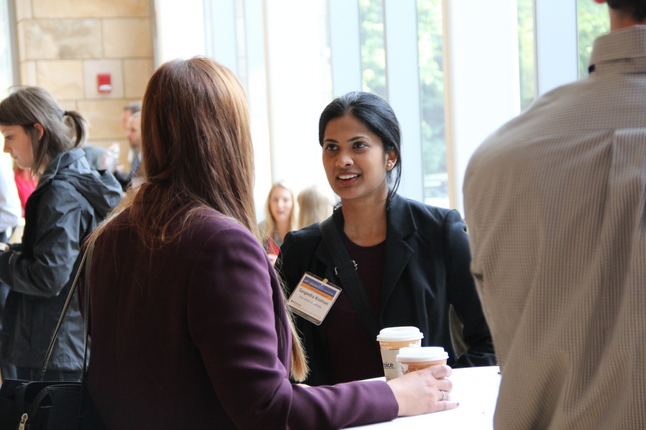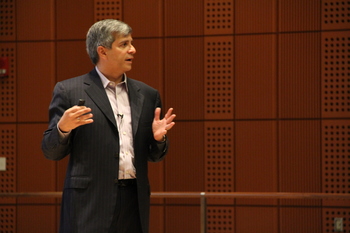Clik here to view.

Sangeetha Krishnan, a part-time MBA student, networks before the keynote address at Entrepalooza on Friday. Krishnan was recognized as a Zell Scholar at the event.
Ben Freed | AnnArbor.com
“Live, breath, sleep, and believe in your product. That is critical for being an entrepreneur,” award winner Anil Arora, president and CEO of personal finance management company Yodlee, said in his keynote address.
Clik here to view.

Anil Arora tells students that belief in themselves and their idea is key to their success as entrepreneurs.
Ben Freed | AnnArbor.com
“Ninety-five percent of business success is execution. How are you going to act upon your vision?” he said.
"And the other key is to believe in yourself. That is 10 times more important than anything else."
After the keynote address, the event split into panel discussions on topics ranging from how to start a company while still in school, to success and failure stories from accomplished entrepreneurs. The nuggets of wisdom were flying fast and furious from entrepreneurs who seemed to naturally speak in sound bites (or perhaps sound bytes).
“Cash is king. Look for money when you don’t need it, because when you need it no one will give it to you,” Maria Thompson, an entrepreneur-in-residence at Arsenal Venture Partners, told one crowd of students.
“Focus your creativity on what you’re building, not on your corporate structure,” Marcia Hatch, a lawyer with Gunderson Dettmer, which specializes in helping startups raise capital, said to another group. “Keep that plain and vanilla as possible; that’s what venture firms want to see.”
Adrian Fortino, co-founder of the FlockTag loyalty program, told one panel that the best advice he ever received was “make sure you are learning from others' mistakes as well as your own.”
RPM Ventures founder Tony Grover said that money for startups is far more accessible now across the board than it had been a few years ago. He said that while that is particularly true in the Midwest, there is still a strong bias from West Coast firms to invest in companies in Silicon Valley and the surrounding areas.
“When it comes down to it, this is still very much a people game,” he said.
“If you’re a West Coast firm, to come to a board meeting in the Midwest, two time zones away, is basically a two-day trip. It’s a major hurdle those companies have to clear, and it has to be a stellar opportunity for that company to agree to make the leap.”
Grover’s firm is based in Ann Arbor and has invested in a number of local companies such as DeepField and Arbor Photonics. He said that companies' ability to function with high capital efficiency (low costs and high output) makes it easier for firms everywhere to justify investments.
The most recurring themes picked up by students were believe in your project whole-heartedly, put everything into it, and do it now.
“I’m already part of a startup,,” said Taylor Davis, who was tweeting her favorite quotes throughout the conference. She’s one of 10 seniors in the creative agency Filmic Productions that produces original multimedia content for the university and other groups.
“Being here was important to learn from leaders about how we make this into a real business. I heard over and over that you really just have to immerse yourself in the product and that’s when you’ll have success.”
First year MBA student Tommy Polzin said there wasn’t a lot that was new to him at the conference, but he was inspired to start jumping into business and pitch competitions right away.
“When you go to enough of these conferences you can hear a lot of things repeated over and over,” he said.
“But one thing I got out of this is the urgency of taking advantage of now. You can’t wait for the opportunities, you just have to go.”
Students were able to take advantage of networking breaks throughout the day as well as a lunch with local entrepreneurs and venture capitalists, many of whom said they were looking for new hires.
Perhaps the biggest but quietest takeaway from the event was the fact that much of what was discussed and many of the companies represented may only be relevant for a few years.
“What makes companies last? Change,” Arora said. “The only thing constant in technology is change.”
Ben Freed covers business for AnnArbor.com. Reach him at 734-623-2528 or email him at benfreed@annarbor.com. Follow him on twitter @BFreedinA2